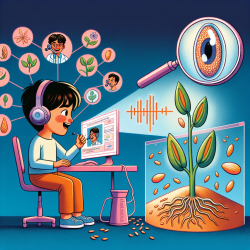Introduction
In the ever-evolving landscape of speech-language pathology, practitioners are continuously seeking innovative approaches to enhance therapeutic outcomes. While plant breeding and speech therapy may seem worlds apart, the recent research article titled Opportunities and Challenges to Improve a Public Research Program in Plant Breeding and Enhance Underutilized Plant Genetic Resources in the Tropics offers insights that can be translated into the realm of speech therapy. This blog explores how the principles derived from plant breeding research can be applied to improve the skills of speech therapists, particularly those providing online therapy services to schools through platforms like TinyEYE.
Research Insights
The research conducted by Cerón-Souza et al. (2021) highlights several principles aimed at improving connectivity among researchers and enhancing the impact of plant breeding programs. These principles include:
- Promoting internal discussions about gender gaps and generational shifts.
- Building long-term initiatives and synergies with governmental bodies.
- Enhancing collaboration between germplasm banks and researchers.
- Focusing collaborative efforts on neglected or underutilized species.
- Creating spaces for project design and training in new technologies.
These principles, while tailored to plant breeding, can be effectively adapted to the field of speech therapy to foster better outcomes for children.
Applying Research Principles to Speech Therapy
1. Promoting Internal Discussions: Just as the research emphasizes addressing gender gaps, speech therapy practitioners can benefit from discussions on diversity and inclusion within their teams. This can lead to more equitable service delivery and innovative therapeutic approaches.
2. Building Long-term Initiatives: Establishing partnerships with educational institutions and governmental bodies can ensure sustained support for speech therapy programs, much like the proposed synergies in plant breeding research.
3. Enhancing Collaboration: Collaboration is key in both fields. Speech therapists can enhance their practice by collaborating with other professionals, such as educators and psychologists, to provide comprehensive support to children.
4. Focusing on Underutilized Resources: Identifying and utilizing underutilized resources, such as digital tools and platforms, can enhance the delivery of online speech therapy services.
5. Creating Spaces for Innovation: Providing opportunities for therapists to engage in research and training can lead to the development of new, evidence-based therapeutic techniques.
Encouraging Further Research
Speech therapists are encouraged to delve deeper into the research findings and explore how these principles can be tailored to their specific practice settings. Engaging in further research and discussions can lead to the development of innovative strategies that enhance therapeutic outcomes for children.
To read the original research paper, please follow this link: Opportunities and Challenges to Improve a Public Research Program in Plant Breeding and Enhance Underutilized Plant Genetic Resources in the Tropics.










